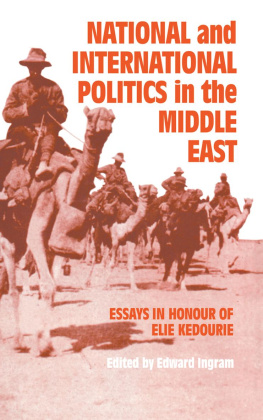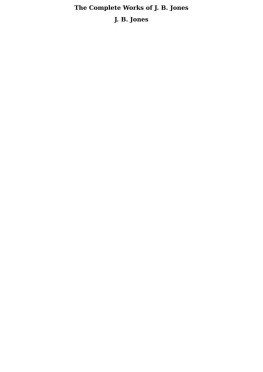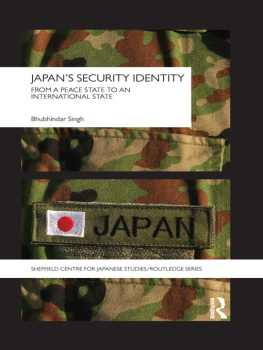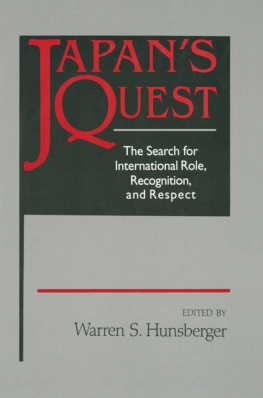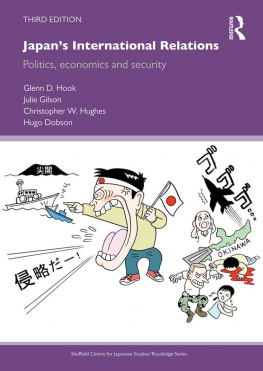Dimensions of
Contemporary Japan
A Collection of Essays
Series Editor
Edward R. Beauchamp
University of Hawaii
Series Contents
History of Contemporary Japan, 19451998
Japanese Society since 1945
Education and Schooling in Japan since 1945
Women and Women's Issues in Post World War II Japan
The Japanese Economy and Economic Issues since 1945
Japan's Role in International Politics since World War II
Japan's Role
in International Politics
since World War II
Edited with an introduction by
Edward R. Beauchamp
University of Hawaii
First published by Garland Publishing, Inc
This edition published 2011 by Routledge
711 Third Avenue, New York, NY 10017
2 Park Square, Milton Park, Abingdon, Oxon, OX14 4RN
Introduction copyright 1998 Edward R. Beauchamp. All rights reserved.
Library of Congress Cataloging-in-Publication Data
Japan's role in international politics since World War II / edited with
an introduction by Edward R. Beauchamp.
p. cm. (Dimensions of contemporary Japan; 6)
Includes bibliographical references.
ISBN 0-8153-2733-1 (alk. paper)
1. JapanForeign relations19451989. 2. JapanForeign relations1989 3. World politics1945 I. Beauchamp, Edward
R., 1933 . II. Series.
DS889.J365 1998
357.52dc21 98-51523
CIP
Publisher's Note
The publisher has gone to great lengths to ensure the quality of this reprint but points out that some imperfections in the original may be apparent.
Contents
Richard J. Samuels
Ronald Dore
Mayumi Itoh
Chunghee Sarah Soh
Laura E. Hein
Takashi Inoguchi
Japan's 1991 Minesweeping Decision:
An Organizational Response
Peter J. Woolley
Ezra F. Vogel
Robert M. Orr Jr.
Perennial Anxiety:
Japan-U.S. Controversy over Recognition of the PRC, 19521958
Sayuri Shimizu
G. Cameron Hurst III
Ezra F. Vogel
Komori Yoshihisa, Ezra Vogel, and Sait Kunihiko
Tanaka Hitoshi
Kond Takeshi, Nogami Yoshiji, and Takenaka Heiz
Okazaki Hisahiko
Lam Peng Er
Rowland T. Maddock
Milton Leitenberg
Hiroshi Kimura
Ksaka Masataka
Introduction
The single, most fundamental goal of the Japan postwar occupation (19451952) was nothing less than the complete and total transformation of Japan from an aggressive, militaristic power into a peaceful, democratic member of the family of nations. All of the policies of the occupation authorities were designed to accomplish this goal. One of the most important ramifications of this policy, in the international realm, was the famous article nine of the American-imposed Constitution of November 3, 1946.
Aspiring sincerely to an international peace based on justice and order, the Japanese people forever renounce war as a sovereign right of the nation and the threat or use of force as a means of settling international disputes.
In order to accomplish the aim of the preceding paragraph, land, sea and air forces, as well as other war potential, will never be maintained. The right of belligerancy of the state will not be recognized.
This statement of pacifism has remained part of Japan's basic law to this day, and has from time-to-time been the subject of heated domestic political debate in all discussions of planning for Japan's national defense. This constitutional structure has been very useful to the Japanese government throughout the postwar years. It has been an expedient tool to point to as a means of resisting American pressures to rearm and to place all of the nation's resources into economic reconstruction and expansion. The great irony is, however, that the article has not proven to be an obstacle in persuading the Japanese people that their rather robust self defense forces are not in violation of the constitutional restriction on military forces.
Even without an official, formal military establishment, however, Japan was not without defenses. A very close political, economic, and military alliance between that country and its patron, the United States, has well served the interests of both powers. These defense arrangements, and the strong sense of pacifism resulting from the disaster of World War II has allowed the Japanese, in a sense, to have their cake and eat it too for almost half a century. As world conditions are changing rapidly because of the fall of the Berlin wall, the breakup of the old Soviet Union, and the American rapproachment with a rising China, these old arrangements are beginning to be examined in ways that would have been unthinkable a generation ago. Virtually all Japanese international activities from 1945 to the present have been shaped by article nine and its ramifications.
This volume recounts the major postwar events and controversies in the realm of Japan's international relations. These include Samuels insightful article on how Japan has dealt with security issues from Meiji (18681912) to the early 1990s. It is followed by Dore's speculation of Japan's future security in the twenty-first century, and should it lean to the East or to the West in pursuing national security interests? Two other analyses of the more generalized context are found in Itoh's examination of the persistance of a sankoku mentality in Japanese foreign policy, and in Hein's analysis of Japanese relations with the West, particularly the United States.
Other contributions deal with specific issues and the influence of Japan's strong sense of pacifism on those issues. Inoguchi discusses Japan's role in United Nations peacekeeping operations while Woolley describes the agony of the debate over whether or not minesweepers should be sent to assist in Gulf War operations. Leitenberg's analysis of possible Japanese military participation in United Nations operations opens up this issue to serious discussion. Vogel speculates on whether a pax Nipponica is on the horizon, and Orr casts a critical eye on Japan's rather extensive foreign aid program. Maddock's explication of Japan's role in the global environmental movement is an example of a relatively safe international issue that is harmonious with the nation's declared peaceful approach.
Major issues that resulted from Japan's prewar and wartime policy are also still with us. Among them are Soh's discussion of the emotional issue of Korean comfort women and their efforts for redress, and Japan's dispute with her neighbor over who owns the Spratly Islands, discussed by Er. Japan's relations with her Russian neighbors have always been contentious and this theme continues, as illustrated in Kimura's essay on Boris Yeltsin's visit to Japan.
The key element in Japan's relations with the world is still that of sometimes rocky relations with the United States. This large topic is discussed by Shimizu in his analysis of the different views of the U.S. and Japan over recognition of the People's Republic of China. Hurst muses about the strains in the U.S.-Japan alliance, and Vogel expresses a strongly held position on post Cold War relations between the two allies. The Japan-U.S. relationship is summed up in a series of short articles from a major Japanese English-language publication,



